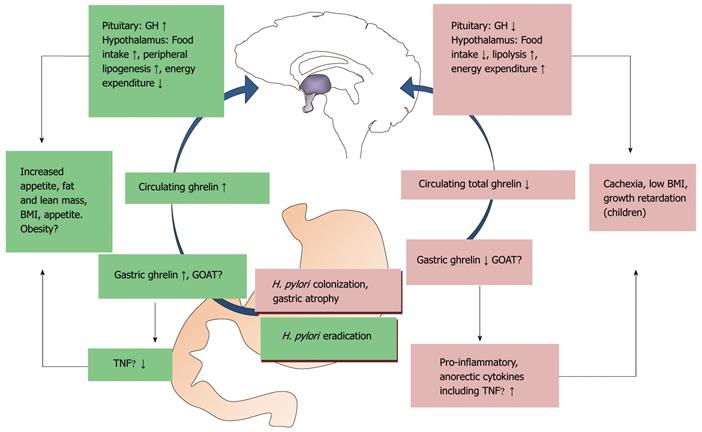Copyright
©2011 Baishideng Publishing Group Co.
World J Gastroenterol. Mar 14, 2011; 17(10): 1249-1260
Published online Mar 14, 2011. doi: 10.3748/wjg.v17.i10.1249
Published online Mar 14, 2011. doi: 10.3748/wjg.v17.i10.1249
Figure 3 Potential pathways leading to reduced appetite, weight loss and pro-inflammatory state in chronic Helicobacter pylori infection, implicating the ghrelin axis.
The majority of studies identify reduced gastric and circulating ghrelin in patients with chronic infection and gastric atrophy which may in turn lead to decreased growth hormone (GH) secretion and somatic growth in children. Reduction in ghrelin signalling in the hypothalamic feeding centres during chronic infection may be responsible for the observed reduced body mass index (BMI) in patients; Helicobacter pylori (H. pylori) eradication and subsequent restoration of ghrelin may reverse this situation. It is speculated that this in turn can contribute to obesity. GOAT? indicates that the effect of H. pylori status on GOAT expression is unknown. ↑: Increase; ↓: Decrease. TNF: Tumor necrosis factor.
-
Citation: Jeffery PL, McGuckin MA, Linden SK. Endocrine impact of
Helicobacter pylori : Focus on ghrelin and ghrelino -acyltransferase. World J Gastroenterol 2011; 17(10): 1249-1260 - URL: https://www.wjgnet.com/1007-9327/full/v17/i10/1249.htm
- DOI: https://dx.doi.org/10.3748/wjg.v17.i10.1249









